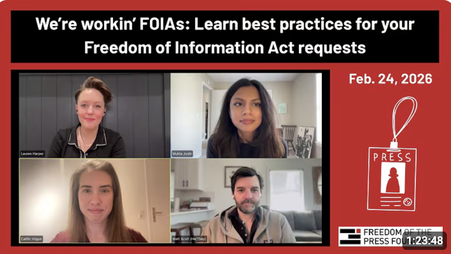Dear Friend of Press Freedom,
I’m Lauren Harper, the first Daniel Ellsberg chair on government secrecy at Freedom of the Press Foundation (FPF), and welcome to “The Classifieds.” Read on to learn more about how the Justice Department’s decision to make it easier for the Trump administration to crack down on reporters spurred a major FPF Freedom of Information Act victory, and more of this week’s top secrecy news stories.
Behind FPF’s major FOIA win
This week, a document I obtained through a FOIA request made headlines across the country.
The declassified document, which you can read here, exposed two of the Trump administration’s most pernicious lies: that intelligence assessments backed up its rationale for deporting groups of Venezuelans to El Salvador, and that reports on the leak of information that contradicted the administration’s deportation claims were inaccurate and damaging to national security.
To quickly recap: In mid-March, the Trump administration invoked the Alien Enemies Act to deport Venezuelans, allegedly targeting members of the Tren de Aragua gang, to El Salvador. To do so, the administration claimed that the gang operates in coordination with Venezuela’s Maduro government. This alleged link is important, because the Act only allows the deportation of citizens of an enemy government — not suspected affiliates of an independent organization.
Shortly after this invocation, The New York Times and The Washington Post both reported on the existence of intelligence community assessments showing that most spy agencies overwhelmingly did not believe Tren de Aragua was coordinating with the Maduro government, seriously undermining the administration’s rationale for its deportations.
I filed the FOIA request for the assessment on April 25, the same day Attorney General Pam Bondi explicitly called out the Times’ and the Post’s reporting on it in her decision to make it easier to target journalists and their sources.
To me, it was clear that the reporting on the leaked memo was in the public interest — not a threat to public safety. I also know that the government is not allowed to classify information in order to prevent embarrassment or conceal wrongdoing, which is what appeared to be happening in this case.
I didn’t expect to get the document, at least not without a lengthy fight (in this case, I expected an appeal and a lawsuit).
To my great surprise, however, it only took seven business days for the FOIA office at the Office of the Director of National Intelligence to send me the document. As anyone who files FOIA requests knows, this is unheard of. It takes ODNI an average of 80 days to process simple FOIA requests, and nine months for more complex requests. And while my request was narrow, it was by no means simple.
I can only speculate why the document was released so quickly, especially after Director of National Intelligence Tulsi Gabbard requested that Bondi open criminal investigations into the initial leak of this document, but I’m glad they did the right thing and disclosed a document the public obviously had the right to read.
Maybe the next time the government will think twice before maligning whistleblowers and inventing reasons to deport people.
What I’m reading
The DEA once touted body cameras for their “enhanced transparency.” Now the agency is abandoning them. (ProPublica) The Drug Enforcement Administration quietly rolled back its body-camera program after President Donald Trump rescinded a Biden-era executive order expanding federal law enforcement’s use of the cameras. The DEA had recently asked Congress for nearly $16 million to expand the program.
Biden’s Gaza pier was more dangerous and costly than previously known. (The Washington Post) The inspector general’s office at the Department of Defense has released a report that shows that the military was not prepared to construct or operate the Biden administration’s floating pier intended to deliver aid to Gaza. The pier cost $230 million and was only operable for three weeks. A separate investigation from the U.S. Agency for International Development shows the Biden administration ignored objections that the pier could hamper diplomatic efforts “to compel Israel to open additional land routes into the war zone.”
Elon Musk tried keeping issues at his Texas mansion private, emails show. (The New York Times) Public records requests show that Elon Musk wanted to “make private a public meeting” about the construction of his Texas compound, some of which was done without a permit. Luckily, city officials weren’t intimidated and kept the meeting public — and released the documents.
Thanks for reading, and see you next time.
Transparently yours,
Lauren Harper
Daniel Ellsberg Chair on Government Secrecy
Freedom of the Press Foundation





